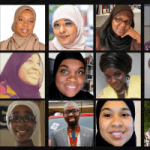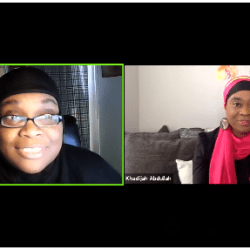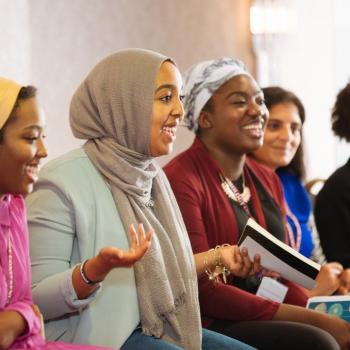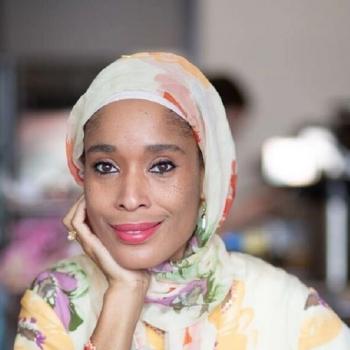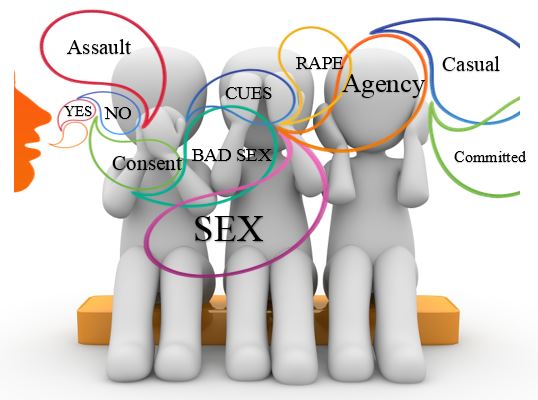
By Layla Abdullah-Poulos
During a discussion about the dynamics of women’s agency and autonomy, specifically in sexual interactions, a phenomenal Muslim woman feminist said something extremely interesting:
“I don’t have any problem admitting that I have little to no sexual agency or autonomy in a male-dominated environment.”
While fleshing out that idea as much as one can in a single conversation, a stark reality manifested. 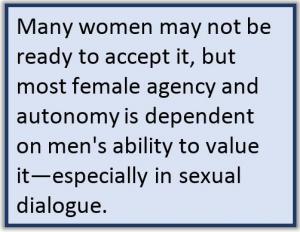 Many women may not be ready to accept it, but most female agency and autonomy is dependent on men’s ability to value it—especially in sexual dialogue.
Many women may not be ready to accept it, but most female agency and autonomy is dependent on men’s ability to value it—especially in sexual dialogue.
If a man doesn’t recognize or ignores a partner’s voice during a sexual interaction, it increases the probability of him engaging in some form of aggressive behavior through either physical force or psychological/emotional coercion. He will embrace misconceptions taught to him that women[1] are accessible commodities for his pleasure, including his current partner.
The concept that women may have compromised agency is hard to grapple in a society packed with blanket messaging about women’s power. We’re trained to become enraptured by our own empowerment with little consideration of what the male gender wields.
Health educator, Maliyka Muhammad asserts:
“We can attempt to have all of the agency we want but if it’s not respected, then we really don’t have any in that situation. It doesn’t mean that you become a doormat. It just means that you have to fight harder.”
Many Muslim women experience additional compulsion via prevailing ideas that if we do not make our bodies immediately and exclusively available to our spouses, we risk damnation. It’s BS, but it’s a common way that the Deen is weaponized against us for the benefit of male privilege – But, I digress.
Considering the reality of male domination (physical or coercive) in sexual dialogue, Muslim men— the proprietors of greater responsibility from Allah—must adhere to prophetic ethics about mutual agency and gratification in sexual experiences. It is imperative that they become better trained to not only respect the agency of their partners but also become intuitive to verbal and non-verbal cues.
Across Muslim cultures, men are not taught to consider sexual competency as part of their divinely-mandated responsibility as protectors and maintainers. In the book A Taste of Honey: Sexuality and Erotology in Islam, Habeeb Akande includes a variety of ahadith and Muslim scholarship reinforcing to Muslim men notions of partner gratification, so the disconnect between faith, intimacy and just leadership needs to be reestablished.
Additionally, Muslim men should concentrate on minimizing sexual aggression by generating accountability in our culture’s spectrum of sexual relationships.
Muhammad reminds:
“As with all things as it relates to women and the disrespect that they receive at the hands of men, other men must check the wrongdoers.”
Muslim women should expect their partners (as servants of Allah) to develop competency skills improving their participation in sexual interactions, so the women with whom they are intimate maintain their agency and autonomy—creating safe, positive experiences.
We need to be prepared to demand that our sexual partners seek excellence in gratifying us, which includes the absence of unwelcome physical force and coercion that results in demeaning sexual aggression. In turn, we must 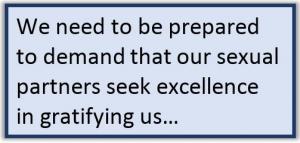 engage in scholarly and social conversations to construct an Islamically-based platform, centering us as participants in sexual interactions with a divine agency that when breached, is a form of disobedience to Allah (swt).
engage in scholarly and social conversations to construct an Islamically-based platform, centering us as participants in sexual interactions with a divine agency that when breached, is a form of disobedience to Allah (swt).
Examining Tough Questions
By the end of the conversation, we agreed that there is an immediate need for discussions from Muslim women’s perspectives because presently, we are primarily wedged between dominant feminist and Muslim male-centered conversations. Talk about a rock and a hard place.
- How do we conceptualize layers of consent and assault in the context of prioritizing revelation and prophetic guidance?
- What influence do intersections of faith, race, class, ability, etc. have on developing these concepts?
- Is female sexual autonomy limited and in what ways?
- Is there a distinction between casual and non-casual sexual relationships and in what ways do relationship parameters effect the criminalization of assault and to what extent?
- How do we support Muslim survivors of a myriad of sexual encounters that include casual, non-casual experiences?
- How do Muslim women demand that men start shifting mindsets in the masculine culture that contributes to negative sexual interactions and hold their brothers accountable? If men aren’t willing or able to do so, what recourse options do we have at our avail?
We need to create a spectrum of ways we conceptualize, sex, intimacy, consent, agency, assault, and a myriad of sexual complexities existing in Muslim experiences. Seeking the guidance of Allah (swt) and his Messenger (saws) is paramount. Then we can extend from there into productive discussions (it’s going to take more than one), avoiding dismissive or triggering language.
With access to Islamic scholarship and dynamic Muslim women academics, the possibility of creating an empowering platform is there. We just have to be ready to engage. I’m hoping NbA Muslims will be a space to start conversations in the immediate future, inshaallah.
For more information on and resources about sexual abuse, visit HEART Women and Girls, a non-profit organization promoting sexual health and sexual violence awareness.
Follow Layla Abdullah-Poulos and NbA Muslims
Twitter
https://twitter.com/deenonthebrain
https://twitter.com/nbamuslims
Facebook
https://www.facebook.com/laylapoulos/
https://www.facebook.com/nbamuslims/
Instagram
https://www.instagram.com/deenonthebrain/
https://www.instagram.com/nbamuslims/
______________________________________________________________________________
[1] There is also men, same-gender and trans-gender victimization, but this post focuses on women as the majority of sexual assault victims.



